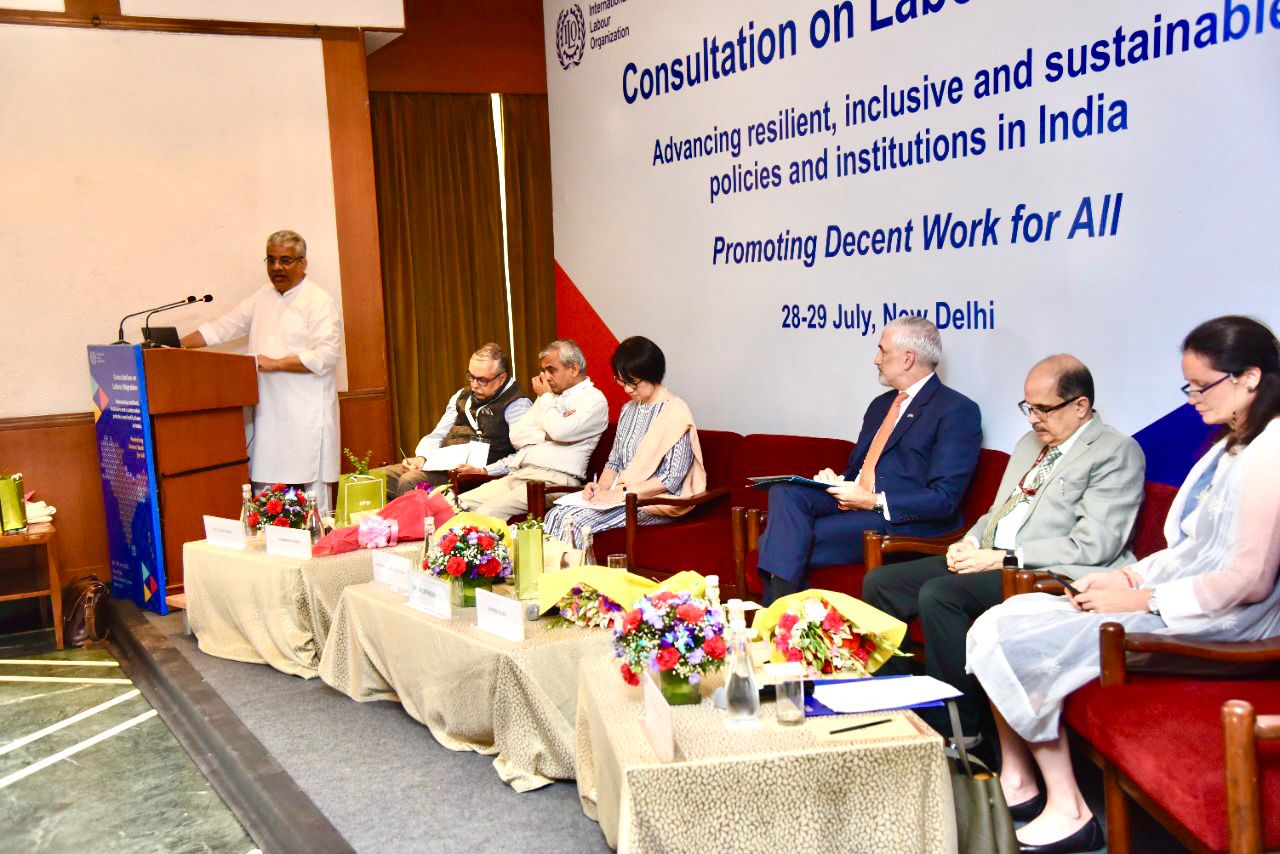International Labour Organization organises Consultation on labour migration in India
Advancing resilient, inclusive and sustainable policies and
institutions in India, promoting decent work for all
India’s response and action
regarding the issue of migration highlighted at ILO’s consultation on labour
migration
No one should be left behind; Bhupender Yadav on social protection of the
workers in the unorganized sector
The
International Labour Organization is hosting its first “Consultation on labour migration: Advancing
resilient, inclusive and sustainable policies and institutions in India,
promoting decent work for all” in New Delhi on 28th and 29th of
July. Millions of workers migrate internally and internationally for better
economic opportunities and as an adaptive strategy in the face of adversities,
which makes labour migration a key policy priority for any country.
Bhupender Yadav Minister of Labour and Employment and
Environment Forest and Climate Change addressed the consultation at the
inaugural session today.
Speaking on the occasion he said that migration and
mobility are related to broader global economic, social, political and
technological transformations. The digitalisation of work emerged through the
thicket of COVID19, and how we work stands transformed. A progressive framework
for labour reforms has been adopted by the government which is in line with the
discussions at ILO Conference in Geneva regarding a safe and healthy working
environment, decent work for all, and social security for every worker.
The Minister
took the opportunity to highlight India’s response and action regarding the
issue of migration. A plethora of initiatives and policy changes were
undertaken under the leadership of the Prime Minister Narendra Modi including
the need to protect our informal and unorganized sector workers said Yadav. In
any country, including India, internal migrants are much more prone to face
issues in relation to health services, food, and other social programmes, said
the Minster enumerating several initiative of the government to provide decent
working conditions, minimum wages, redressal mechanisms, protection from abuse
and exploitation, enhancement of skills etc.
The advent of
digitalization has led to the emergence of a new category of workers i.e. the
gig worker and the platform worker. Proactively taking cognizance of the same,
India has provided a legal definition for them in the new Labour Code, that
will enable the government to include them in policy decisions, stated the
Union Minister.
In order to boost employment and livelihood opportunities for migrant workers,
several steps were taken by the government to promote skill development.
Mapping of the rural migrant labour was also done to enhance their
employability based on the skills; they possess, to enable them to work closer
to their homes, the Minister shared in his speech.
The Minister further said that skill gap mapping
identifies the sectors and requirements of skilled workforce across the world
and enhances opportunities for Indian workers abroad. “National Career Service
of the Ministry of Labour& Employment and the Pre Departure Orientation
Programme (PDOT) facilitate the movement of skilled labour across international
borders. 'One Nation One Ration Card' scheme for subsidized ration under public
distribution system in any state of the country among other initiatives ensured
Roti, Kapda and Makaan (Food, clothes
and Home) for one and all with a motto that no one should be left behind,” the
Minister said emphasising on social protection of the workers in the unorganized
sector.
“The government has outlined the challenges as well as
identified the possible solutions for the same and is committed to effectively
acting on them, despite the many challenges that the pandemic has brought
along.” concluded the Minister in his speech.
The Consultation also focuses on themes such as
educational and skill development investments, recognition of prior learning
and effective practices of fair recruitment, as parameters for policy
development and programme interventions to address specific labour migration
issues for both women and men migrant workers.
Migrant workers make essential development contributions
to the economic and socio-cultural landscape of a nation. The Consultation aims
to address how migrant workers, both internally and internationally, are among
the most vulnerable, facing issues of wage insecurity, casual work
arrangements, lack of social protection and even skills gaps, which the ILO’s
Decent Work and Fair Migration Agenda aims to remedy. Additionally, panellists
will engage in context-setting through the ‘lived experiences' of migrant
workers including occupational safety and health, and sectoral policy
challenges and opportunities during the two day process.
“Migrant workers can help the economy reap the demographic
dividend when quality jobs, adequate healthcare and nutrition and universal
social protection are provided. The ILO is committed to improving the working
conditions for migrant workers through collaborative institution-based
strategies, developed through tripartite dialogue” said Chihoko Asada-Miyakawa, ILO Regional Director for the Asia and Pacific.


